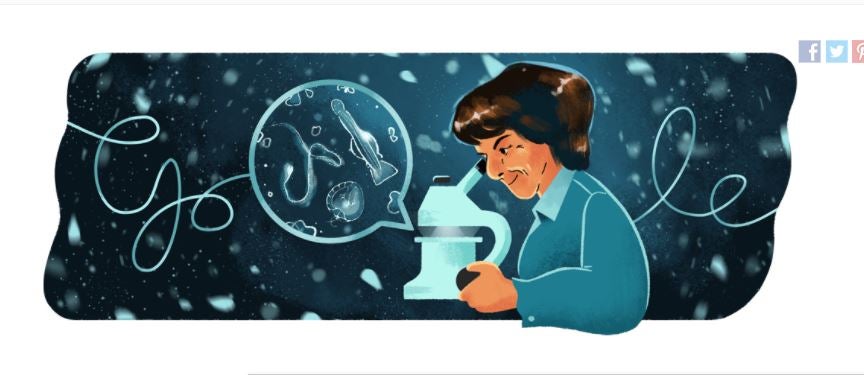Google Doodle marks birthday of Spanish ocean scientist María de los Ángeles Alvariño González
Pioneering scientist discovered 22 new species of zooplankton and published over 100 scientific papers

Your support helps us to tell the story
From reproductive rights to climate change to Big Tech, The Independent is on the ground when the story is developing. Whether it's investigating the financials of Elon Musk's pro-Trump PAC or producing our latest documentary, 'The A Word', which shines a light on the American women fighting for reproductive rights, we know how important it is to parse out the facts from the messaging.
At such a critical moment in US history, we need reporters on the ground. Your donation allows us to keep sending journalists to speak to both sides of the story.
The Independent is trusted by Americans across the entire political spectrum. And unlike many other quality news outlets, we choose not to lock Americans out of our reporting and analysis with paywalls. We believe quality journalism should be available to everyone, paid for by those who can afford it.
Your support makes all the difference.The Google Doodle today (3 OCtober) celebrates the 105th birthday of Spanish-American professor and marine research biologist María de los Ángeles Alvariño González, who is regarded as one of the most important Spanish scientists of all time.
Born in 1916, her love of natural history began with her father’s library and deepened as she pursued coastline oceanography research.
Although the Spanish Institute of Oceanography (IEO) only accepted men at the time, her university work impressed the organization so much that they appointed her as a marine biologist in 1952.
Based in Vigo, she began her pioneering research on zooplankton, tiny organisms that serve as the foundation of the oceanic food chain and identified some species to be the best indicators of ocean health.
In 1953, the British Council awarded Ángeles Alvariño a fellowship that resulted in her becoming the first woman to work as a scientist aboard a British research vessel.
Following several expeditions, she furthered her studies in the United States where she retired as one of the world’s most prestigious marine biologists in 1987.
During her career she discovered 22 new species of zooplankton and published over 100 scientific papers. Even today she is the only Spanish scientist of 1,000 in the “Encyclopedia of World Scientists,” and a modern research vessel in IEO’s fleet bears her name.
Join our commenting forum
Join thought-provoking conversations, follow other Independent readers and see their replies
Comments